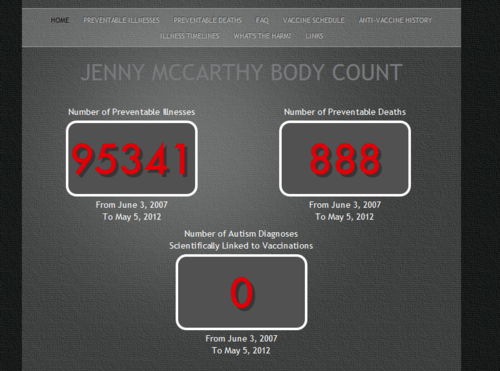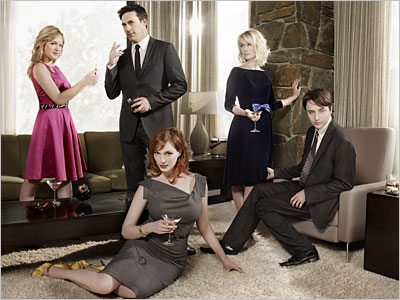 This brings me to Public Enemy Number One, a dangerous woman in the public eye who is vomiting bullshit that is being lapped up by people worldwide. The woman is Jenny McCarthy, the seemingly innocuous former Playboy bunny and 'actress' who is now using her celebrity to misderect and misinform people about a very serious issue: vaccinations and their 'link' to autism.
This brings me to Public Enemy Number One, a dangerous woman in the public eye who is vomiting bullshit that is being lapped up by people worldwide. The woman is Jenny McCarthy, the seemingly innocuous former Playboy bunny and 'actress' who is now using her celebrity to misderect and misinform people about a very serious issue: vaccinations and their 'link' to autism.Jenny McCarthy has a child with autism, as anyone who has glanced at tabloid magazines or channel flipped through daytime talk shows knows. Parenting a child with autism is incredibly stressful, taxing, and requires 110% of one's time and patience. Relying on government funding is like relying on a cinder block to keep you afloat when you're drowning. For the average parent, their entire life is devoted to doing what's best for their child with autism no matter what. Sure, they can make their voice heard through newspapers and local TV stations, but global attention is something rarely granted to the average. For celebrities, though, things are different. They have a real chance to sink money into and shed light on scientific research. They have a chance to the advance the medical field and make a difference for people all over the world. This gift is a double edged sword, however.
 When Andrew Wakefield published his 1998 paper in the medical journal The Lancet titled Ilial-nymphoid nodular hyperplasia, non-specific colitis, and pervasive developmental disorder in children, the ground of the autistic community shook. The paper itself was dense and full of jargon, as most medical research papers are, but there was a take home message that was very easy to understand: vaccinating your children is bad. Specifically, the measles, mumps, and rubella vaccine (MMR) is an agent to cause autism in your children. Yup. Cause autism in your children. Talk about fearmongering. There are thousands of papers published in these academic journals, though. Controversial ones to boot. Perhaps this paper would have been swept under the rug, dismissed as pseudoscientific garbage, if it were not for a high profile mouthpiece attached to it. Enter Ms. McCarthy, a pretty blonde whose face looks great on magazine covers and TV shows, who also has a personal stake in autism research. She chooses to back this pseudoscientific nonsense with as much firepower as she possibly can. The result? In 2008, for the first time in 14 years, mumps was considered an endemic in the UK. In 2011, there were over 200 cases of measles reported, up from the 60-70 average per year. True, before the vaccine was introduced in the 60s, cases numbered in the millions, but this is a startling rise nonetheless. Of the cases in 2011, over 80% were either unvaccinated or the vaccination status was unknown. 13% of these were for children one and under, and unable to receive the vaccination. So what does common sense tell us? Not vaccinating your child not only puts them at risk, but also endangers the lives of children who are still too young to receive the vaccination. These numbers were not found on some crackpot website but the Centre of Disease Control and Prevention. And to boot, autism cases are on the rise. What the fuck?! How could people not see this coming?
When Andrew Wakefield published his 1998 paper in the medical journal The Lancet titled Ilial-nymphoid nodular hyperplasia, non-specific colitis, and pervasive developmental disorder in children, the ground of the autistic community shook. The paper itself was dense and full of jargon, as most medical research papers are, but there was a take home message that was very easy to understand: vaccinating your children is bad. Specifically, the measles, mumps, and rubella vaccine (MMR) is an agent to cause autism in your children. Yup. Cause autism in your children. Talk about fearmongering. There are thousands of papers published in these academic journals, though. Controversial ones to boot. Perhaps this paper would have been swept under the rug, dismissed as pseudoscientific garbage, if it were not for a high profile mouthpiece attached to it. Enter Ms. McCarthy, a pretty blonde whose face looks great on magazine covers and TV shows, who also has a personal stake in autism research. She chooses to back this pseudoscientific nonsense with as much firepower as she possibly can. The result? In 2008, for the first time in 14 years, mumps was considered an endemic in the UK. In 2011, there were over 200 cases of measles reported, up from the 60-70 average per year. True, before the vaccine was introduced in the 60s, cases numbered in the millions, but this is a startling rise nonetheless. Of the cases in 2011, over 80% were either unvaccinated or the vaccination status was unknown. 13% of these were for children one and under, and unable to receive the vaccination. So what does common sense tell us? Not vaccinating your child not only puts them at risk, but also endangers the lives of children who are still too young to receive the vaccination. These numbers were not found on some crackpot website but the Centre of Disease Control and Prevention. And to boot, autism cases are on the rise. What the fuck?! How could people not see this coming?In 2010, Andrew Wakefield had his medical license revoked. He is no longer legally allowed to practice medicine in the UK or the US. He is a disgrace, a fraud, and in my opinion, an evil bastard. To this day, he is a figurehead of the antivaccination campaign. Just last month, he and Jenny McCarthy served as keynote speakers at the Autism One conference is Illinois. They focus on conspiracy theories from big pharma and the government and claim to offer 'the truth' about autism and your child. Dozens of other speakers and presenters also claim to have the answer to treating autism, but not without a price. They sell books and expensive equipment (you think hyperbaric oxygen treatment is cheap?), all in the name of science. My question is: how on earth can people put their faith in a disgraced 'doctor' and a celebrity who has zero medical training whatsoever? Easy. They offer an easy to swallow attractive solution with a lot of media traction, while real scientists and researchers are working tirelessly to find real causes and treatment options.
So who is to blame for this enormous fuckup? Are the doctors who published this fraudulent paper who have since been charged with dishonesty and abuse of delvelopmentally disabled children? The celebrity endorsers of this quackery who lend time and money to forward a cause that only causes harm? Or the people, the ignorant masses, who believe every word of these snake-oil salesmen? Yes to the first two, but resoundingly so to the third. This endemic of ignorance and fear would have been snuffed out like a flame in a hurricane had people done some research and made choices for themselves. People need to educate themselves, to look at all sides of the issue with a skeptical eye, before they make such drastic decisions like eschewing vaccinations for their children. It's incredible how far a little common sense will go.




